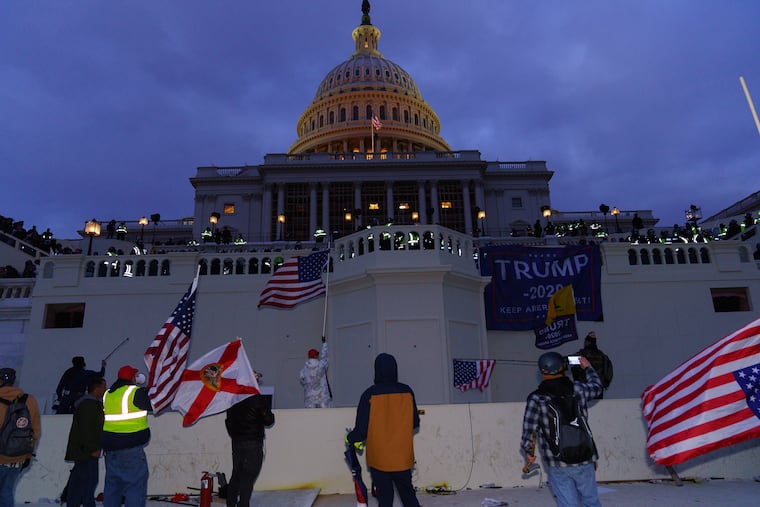Vanguard, BlackRock lag State Street on some proxy votes seeking political donation disclosures: new study
Vanguard says it evaluates shareholder resolutions on political donation on a case-by-case basis.

Wall Street has slowly begun asking for more disclosure of political donations -- although not every big institutional investor votes consistently for more transparency.
That’s the conclusion of a new study by the Washington, D.C.-based Center for Political Accountability, which found that many Wall Street investment firms voted for shareholder proposals surrounding political donations during the 2020 proxy voting season, which ended in June 2020.
But Malvern-based Vanguard and BlackRock have not been among them, according to the center’s December study.
Of 69 large investment firms polled, 30 voted for political spending disclosure resolutions every time, while eight failed to support a single resolution. Forty of the 69 investors increased voting support for transparency from 2019 to 2020, while eight decreased voting support.
Since 2018, 31 of these investment fund firms increased their support for the political disclosure resolution while just nine decreased their support.
“The surge in support for disclosure reflects large investors’ recognition of the risks of political spending in today’s hyper-polarized environment, particularly in an election year,” said CPA president Bruce Freed.
“Investors understand this should be the norm for companies,” he added.
In light of last week’s insurrection on Capitol Hill, Corporate America and Wall Street firms including Vanguard and BlackRock paused political action committee donations to lawmakers. Blue chip companies have also severed ties with legislators who voted against President-elect Joe Biden’s victory.
Still, some Wall Street firms have moved more slowly than others in supporting CPA’s resolutions on political donations.
“Despite nearly all other large investors moving towards increasing support for election-related transparency, BlackRock and Vanguard have stayed on the sidelines when their enormous voting power could curb risk for shareholders while strengthening democracy,” Freed said.
In response, Vanguard spokeswoman Alyssa Thornton issued this statement: “As an investment manager, Vanguard stewards the assets of 30 million clients with a wide range of personal beliefs. Vanguard—and the Vanguard funds—do not hold or espouse particular political points of view. Through engagement with company boards Vanguard’s Investment Stewardship team encourages thorough and effective oversight of any political spending and lobbying activity, with careful consideration for alignment with stated business strategy and the long-term risks any activities may present. Proxy voting proposals regarding political spending are evaluated on a case-by-case basis, prioritizing the long-term financial materiality to a fund’s investors.”
As of the end of 2020, Vanguard said, it paused all political donations.
And last week, the $6 trillion asset manager reiterated that “recent events in the U.S. political landscape have raised new questions about the potential risks associated with corporate political activity, and the Vanguard Funds will take that into consideration in our case-by-case analysis, in the same manner in which we integrate other market developments and new data,” the Vanguard spokeswoman said in the statement.
BlackRock and Vanguard do not retain ISS, Glass Lewis or other outside proxy advisors.
“We use a variety of resources to help inform our overall analysis. Importantly, we do not vote in lockstep with recommendations from proxy advisors, the Vanguard spokesperson said.
Smaller firms like Philadelphia-based Friends Fiduciary Corp. have long supported shareholder resolutions regarding transparency in corporate political contributions.
“We urge laggards like Vanguard to reconsider their votes against oversight and disclosure, particularly because the reputational risks to companies have become even more clear with a number of politicians either directly or indirectly fomenting division resulting in the riots at the Capitol,” said Kate Monahan, shareholder engagement manager at the Quaker-affiliated Friends Fiduciary.
Money & Politics
Lobbying and political spending resolutions typically call on public companies to enhance disclosures of political expenditures on elections and lobbying, including payments to lobbyists at the state and federal levels, payments to trade associations used for lobbying, and payments for grassroots activities aimed at influencing policymakers.
While companies are required to disclose direct federal lobbying expenditures, state disclosure policies vary widely and companies often use trade associations to influence public policy indirectly. Membership in and payments to these trade associations can be a significant contradiction between a company’s behavior and its goals, according to Majority Action think tank.
BlackRock disputed the center’s conclusions, claiming it has forward-looking goals for more transparency.
In the firm’s 2021 Stewardship Expectations, BlackRock said it will now “seek confirmation from companies, through engagement or disclosure, that their corporate political activities are consistent with their public statements on material and strategic policy issues. Moreover, we expect companies to monitor the positions taken by trade associations of which they are active members on such issues for consistency on major policy positions and to provide an explanation where inconsistencies exist.”
In the report, BlackRock said it asked for “enhanced disclosure of political activities, including at Cintas and Origin, two public companies.
CPA worked with Proxy Insight to examine the 69 investors’ votes across the 2018-2020 proxy seasons.
The 69 investors identified were those in the Proxy Insight database that cast votes on at least five CPA model-resolutions in each of the last three proxy seasons and were among the 100 largest investors by global assets under management.
Other notable findings: In 2019, only 14 of the 69 investors supported 100% of shareholder resolutions; in 2020, that number rose to 30 investors.
Only eight investors failed to support a single political spending disclosure resolution in 2020 compared with 13 groups in 2019 and 12 in 2018.
A full copy of the study is on CPA’s website: politicalaccountability.net/reports/cpa-reports.